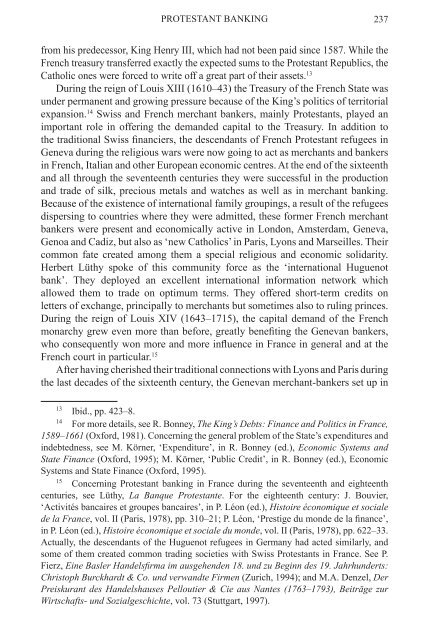the world of private banking
the world of private banking
the world of private banking
Create successful ePaper yourself
Turn your PDF publications into a flip-book with our unique Google optimized e-Paper software.
PROtEStANt bANKING 237<br />
from his predecessor, King Henry III, which had not been paid since 1587. While <strong>the</strong><br />
French treasury transferred exactly <strong>the</strong> expected sums to <strong>the</strong> Protestant Republics, <strong>the</strong><br />
Catholic ones were forced to write <strong>of</strong>f a great part <strong>of</strong> <strong>the</strong>ir assets. 13<br />
During <strong>the</strong> reign <strong>of</strong> Louis XIII (1610–43) <strong>the</strong> Treasury <strong>of</strong> <strong>the</strong> French State was<br />
under permanent and growing pressure because <strong>of</strong> <strong>the</strong> King’s politics <strong>of</strong> territorial<br />
expansion. 14 Swiss and French merchant bankers, mainly Protestants, played an<br />
important role in <strong>of</strong>fering <strong>the</strong> demanded capital to <strong>the</strong> Treasury. In addition to<br />
<strong>the</strong> traditional Swiss financiers, <strong>the</strong> descendants <strong>of</strong> French Protestant refugees in<br />
Geneva during <strong>the</strong> religious wars were now going to act as merchants and bankers<br />
in French, Italian and o<strong>the</strong>r European economic centres. At <strong>the</strong> end <strong>of</strong> <strong>the</strong> sixteenth<br />
and all through <strong>the</strong> seventeenth centuries <strong>the</strong>y were successful in <strong>the</strong> production<br />
and trade <strong>of</strong> silk, precious metals and watches as well as in merchant <strong>banking</strong>.<br />
Because <strong>of</strong> <strong>the</strong> existence <strong>of</strong> international family groupings, a result <strong>of</strong> <strong>the</strong> refugees<br />
dispersing to countries where <strong>the</strong>y were admitted, <strong>the</strong>se former French merchant<br />
bankers were present and economically active in London, Amsterdam, Geneva,<br />
Genoa and Cadiz, but also as ‘new Catholics’ in Paris, Lyons and Marseilles. Their<br />
common fate created among <strong>the</strong>m a special religious and economic solidarity.<br />
Herbert Lüthy spoke <strong>of</strong> this community force as <strong>the</strong> ‘international Huguenot<br />
bank’. They deployed an excellent international information network which<br />
allowed <strong>the</strong>m to trade on optimum terms. They <strong>of</strong>fered short-term credits on<br />
letters <strong>of</strong> exchange, principally to merchants but sometimes also to ruling princes.<br />
During <strong>the</strong> reign <strong>of</strong> Louis XIV (1643–1715), <strong>the</strong> capital demand <strong>of</strong> <strong>the</strong> French<br />
monarchy grew even more than before, greatly benefiting <strong>the</strong> Genevan bankers,<br />
who consequently won more and more influence in France in general and at <strong>the</strong><br />
French court in particular. 15<br />
After having cherished <strong>the</strong>ir traditional connections with Lyons and Paris during<br />
<strong>the</strong> last decades <strong>of</strong> <strong>the</strong> sixteenth century, <strong>the</strong> Genevan merchant-bankers set up in<br />
13<br />
Ibid., pp. 423–8.<br />
14<br />
For more details, see R. Bonney, The King’s Debts: Finance and Politics in France,<br />
1589–1661 (Oxford, 1981). Concerning <strong>the</strong> general problem <strong>of</strong> <strong>the</strong> State’s expenditures and<br />
indebtedness, see M. Körner, ‘Expenditure’, in R. Bonney (ed.), Economic Systems and<br />
State Finance (Oxford, 1995); M. Körner, ‘Public Credit’, in R. Bonney (ed.), Economic<br />
Systems and State Finance (Oxford, 1995).<br />
15<br />
Concerning Protestant <strong>banking</strong> in France during <strong>the</strong> seventeenth and eighteenth<br />
centuries, see Lüthy, La Banque Protestante. For <strong>the</strong> eighteenth century: J. Bouvier,<br />
‘Activités bancaires et groupes bancaires’, in P. Léon (ed.), Histoire économique et sociale<br />
de la France, vol. II (Paris, 1978), pp. 310–21; P. Léon, ‘Prestige du monde de la finance’,<br />
in P. Léon (ed.), Histoire économique et sociale du monde, vol. II (Paris, 1978), pp. 622–33.<br />
Actually, <strong>the</strong> descendants <strong>of</strong> <strong>the</strong> Huguenot refugees in Germany had acted similarly, and<br />
some <strong>of</strong> <strong>the</strong>m created common trading societies with Swiss Protestants in France. See P.<br />
Fierz, Eine Basler Handelsfirma im ausgehenden 18. und zu Beginn des 19. Jahrhunderts:<br />
Christoph Burckhardt & Co. und verwandte Firmen (Zurich, 1994); and M.A. Denzel, Der<br />
Preiskurant des Handelshauses Pelloutier & Cie aus Nantes (1763–1793), Beiträge zur<br />
Wirtschafts- und Sozialgeschichte, vol. 73 (Stuttgart, 1997).












![[Pham_Sherisse]_Frommer's_Southeast_Asia(Book4You)](https://img.yumpu.com/38206466/1/166x260/pham-sherisse-frommers-southeast-asiabook4you.jpg?quality=85)



